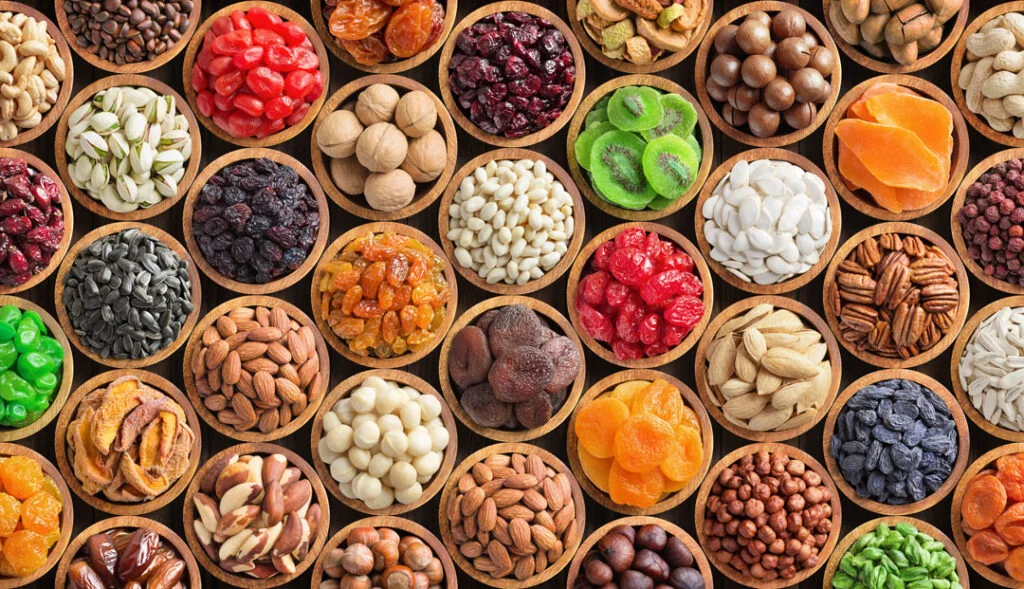
We’ve all heard the saying, “You are what you eat”, but what about “You sleep how you eat?” Okay, that’s not something people say, but perhaps we should. After all, there’s a strong association between the nutritional quality of our diet and how well-rested we are. If you’re not fueling your body well, you’re not going to sleep very well.
Furthermore, there are specific foods that help you sleep and ones that are probably best avoided if you’re not sleeping very well. If that got your attention, read on to discover what we recommend adding to your diet for better Z’s.
Note: The content on Sleepopolis is meant to be informative in nature, but it shouldn’t be taken as medical advice, and it shouldn’t take the place of medical advice and supervision from a trained professional. If you feel you may be suffering from any sleep disorder or medical condition, please see your healthcare provider immediately.
Long Story Short
- Nutrition has a significant impact on your sleep because of the beneficial nutrients and compounds that some foods have (and others don’t).
- Foods like tart cherries, nuts, fatty fish, and kiwis may support better sleep because of how they support the brain chemicals involved in your sleep-wake cycle — like melatonin and serotonin — and the relaxing micronutrients they contain, like certain B vitamins and magnesium.
- Avoid ultra-processed foods, excessive alcohol, and late-day caffeine, as these can make it harder to fall asleep and stay asleep.
Best Foods for Sleep Video
Tart Cherries or Cherry Juice
Tart cherries are one of nature’s tastiest sources of melatonin, a hormone that helps regulate your sleep-wake cycles. As such, it’s been extensively studied — mostly in the forms of extracts and cherry juice — for its benefits on sleep quality and duration.
For example, some research suggests that drinking tart cherry juice in the hours leading up to bedtime may help supplement your body’s existing levels of melatonin, promoting sleepiness. Tart cherries also contain antioxidants and anti-inflammatory compounds that may help improve overall sleep quality. (1)
Still, more research is needed to fully understand how tart cherries might help sleep, including the best dosage. Most people likely don’t consume enough of them (or other melatonin-containing foods) to obtain the amount of melatonin needed to make a noticeable difference, especially without other sleep-supporting behaviors in place. (2) (3)
If you do give it a try, it makes the most sense to drink your 240 mL — or about eight ounces — cup of tart cherry juice 1-2 hours before you lay down for bed. This may help prevent having to get up to use the restroom later.
Additionally, drink it at least 30 minutes before brushing your teeth, as tart cherry juice is also a source of sugar, which can damage your teeth. Following this timeline and brushing well should help keep tooth decay at bay.
And speaking of sugar — if juice is not freshly squeezed, pressed, or otherwise produced, there’s a good chance it is artificially sweetened with added sugar. If you’re going to try out this sleep remedy, be sure to check the label of your selected juice for added sugars before you buy.
Nuts and Seeds
Adding a handful of almonds, walnuts, or cashews to your evening routine may be beneficial for your sleep. Not only is this a quick and easy snack, but nuts are rich in magnesium, a mineral that helps promote relaxation. (4)
Magnesium isn’t a one-trick pony: it also helps regulate brain chemicals involved in regulating your sleep patterns, such as GABA and melatonin. (5) Nuts also contain an amino acid called tryptophan — yep, the one found in turkey — which is the precursor of serotonin and melatonin, two sleep powerhouses. (6)
Michelle Rauch, MSc, RDN, tells Sleepopolis, “Pumpkin, chia, and flax seeds in addition to peanuts, pistachios, almonds, and walnuts all contain tryptophan, an amino acid that is a precursor to serotonin and melatonin — both of which are important for regulating sleep-wake cycles.”
Note that nuts and seeds are calorie-dense, so if you’re paying attention to daily energy (calorie) intake, know that they can contribute a significant amount in small portion sizes.
Tea
Many people enjoy a warm cup of tea before bed, but certain brews are especially good for improving sleep. Some of the best sleep-promoting teas include the following:
- Chamomile offers calming effects to help prepare you for bedtime.
- Lavender has soothing benefits to help ease stress and tension before bed. (7)
- Valerian root* is known for its sedative properties that can promote relaxation. (8)
- Peppermint is often associated with improved digestion and relaxation. (9)
Fatty Fish
If you like salmon, trout, or mackerel, you’re in luck — these types of fish may help you sleep better. This is because they’re high in omega-3 fatty acids, including EPA (eicosapentaenoic acid) and DHA (docosahexaenoic acid). (10)
EPA and DHA are known to have anti-inflammatory effects. They’re also heavily active in your brain, where they help make serotonin, a brain chemical involved in sleep and mood. (11)
Plus, you can get some of your daily vitamin D needs met by adding fatty fish to your menu a few times per week. Research shows that not getting enough vitamin D is associated with worsened sleep, so it’s a “two birds one stone” situation. (12)
Turkey or Ham Roll Ups
Turkey and ham are both sources of tryptophan. Tryptophan changes into serotonin in the brain, which in turn can be converted into melatonin. (13) While turkey is often associated with inducing sleepiness (hello, Thanksgiving nap), ham contains a similar amount of tryptophan.
Including tryptophan sources as part of a balanced meal a few hours before bedtime may promote relaxation for some people. (14) For instance, making turkey or ham roll-ups, and using ingredients like leafy greens, tomatoes, hummus, and avocado, on a whole grain tortilla, to help create a well-rounded balance of nutrients.
Sweet Potatoes
Sweet potatoes are rich in complex carbohydrates like fiber, which are slowly digested. This can help prevent you from waking up at night thanks to hunger and blood sugar fluctuations. (15)
They’re also a good source of potassium and magnesium, minerals known for their relaxing properties. Magnesium, in particular, supports muscle relaxation and may help calm the nervous system. (4) (16)
“One sweet potato contains 700 mg potassium or 15 percent of the recommended daily amount,” Patricia Kolesa MS, RDN, tells Sleepopolis. She continues, “Potassium has been shown to support muscle and nerve function, specifically in the heart, and circadian rhythm, which can help promote relaxation and better sleep.”
Sweet potatoes also contribute vitamin B6, which is involved in the production of serotonin. Consider eating baked sweet potatoes, making air-fryer sweet potato chips, or adding roasted cubed sweet potatoes to your dinner plate.
Hummus
Hummus is a dip made from chickpeas (garbanzo beans), tahini, olive oil, and various spices. Chickpeas are a great source of plant protein, as well as tryptophan. (17)
“Hummus made from chickpeas can be a great source of tryptophan,” affirms Amy Beney MS RD CDCES. “Tryptophan is an essential amino acid. It also helps make serotonin which is a feel-good body chemical, and melatonin, which can help with sleep.”
Additionally, hummus contains healthy fats, which may help stabilize blood sugar levels and prevent spikes and crashes that can disrupt your sleep. (18) The combination of protein and fiber in hummus can help promote feelings of fullness and satiety that last through the night.
Use hummus as a spread on sandwiches or as a dip for fresh veggies on your dinner plate.
Honey
Honey contains glucose (sugar), which interestingly tells the brain to shut off orexin, a brain chemical associated with wakefulness. (19) This doesn’t mean eating sugar before bed is a good practice for sleep, though — it just means you might consider adding a splash of honey to a warm cup of decaffeinated herbal tea before bed to help provide a calming effect. A little bit goes a long way with sweetening agents like honey, as they do increase blood sugar, so it’s best to use it sparingly.
Kiwi
Kiwi contains antioxidants, vitamins C and E, serotonin, and folate, which have been shown to positively impact sleep. (20) Studies suggest that regularly eating kiwi, such as two per day an hour before bed, may help you sleep better and more restfully. (21)
“In a recent small study, elite athletes had significant improvements in sleep time and sleep efficiency while reducing the number of times they woke up throughout the night when eating two kiwi fruits before bed,” Kelsey Kunik, RDN, tells Sleepopolis. This was compared to athletes who ate no kiwi, so it may be worth a try! (21)
Plus, one kiwi contains 2-3 grams of fiber, which is enough to help support digestion and keep you fuller through the night without causing discomfort. (22)
How Diet Impacts Sleep
“Nutrition is often an overlooked part of getting quality, restful sleep, but it’s an important one!” says Karman Meyer, dietitian and author of Eat To Sleep: What To Eat & When To Eat It for a Good Night’s Sleep. She continues, “Certain foods can give us the essential nutrients our bodies need to sleep well at night.”
If your goal is to sleep better, pay attention to how certain types of foods might be affecting you. For instance, consuming heavy, high-fat, acidic, or spicy meals close to bedtime might lead to discomfort or indigestion. Instead, choose lighter meals that provide a balance of healthy nutrients to keep your blood sugar stable and your belly fuller.
Meyer also notes that while there’s no specific diet pattern for better sleep, the bottom line is to eat more nutrient-rich foods and ditch the excess junk foods.
Experiment with some of the foods that help you sleep above, which contain sleep-promoting compounds, like tryptophan, serotonin, or melatonin. Including these in your last meal of the day may help support relaxation as you prepare for bedtime and consider your overall diet pattern. (20)
“A person’s overall diet can be a factor in making sleep better or worse,” agrees Sandra Chavez, MS, RDN. “While there is no one perfect diet for every person, generally a Mediterranean-style eating pattern contains a balance of nutrition that promotes good sleep. A healthy dose of omega-3’s from fatty fish and some nuts, complex carbohydrates, and lean proteins are just a few of the sleep-promoting benefits of this eating style.”
In addition to eating a healthy diet, it’s important to practice lifestyle habits that support better sleep. “Sleeping similar hours, such as having a fairly regular bedtime and wake-up time each night helps get your body into a routine. Also, having a bedtime routine helps your body prep for sleep and know it’s time to wind down and get ready for good sleep,” says PCOS and menopause dietitian Bess Berger, RDN.
Foods to Avoid for A Good Night’s Sleep
You probably noticed a theme in the list of recommended sleep-promoting foods above. None of them are high in added sugar, sodium, or saturated fat. That’s because these types of ultra-processed foods often come in packages and tend to be high in empty calories.
In other words, they contribute a good chunk of energy but not many beneficial nutrients. As a result, ultra-processed foods are generally digested quickly, leading to a dramatic spike (and fall) in blood sugar. They also don’t keep you full for very long or contain compounds known to benefit sleep. (23)
Some examples of ultra-processed foods likely to keep you awake at night include:
- Packaged snack foods, like potato chips and cookies
- Fried foods
- Fast foods
- Packaged freezer meals
- Soda, fruit juice, and energy drinks
- Baked goods, like donuts, cookies, and pastries
- Candy
Dietitian Lisa Andrews, MEd, RD, LD, tells Sleepopolis, “For clients with insomnia, I advise cutting off caffeine by 12 p.m., including chocolate, [caffeinated] tea, or other forms of caffeine. I also suggest avoiding high-fat foods that are harder to digest and may exacerbate GERD.”
As tempting as that afternoon espresso may be, drinking caffeinated beverages later in the day may make it harder to fall asleep. (24) Furthermore, consuming excessive alcohol has been attributed to a night of more interrupted sleep, too. (25)
FAQs
Are there foods I can eat to feel less sleepy?
To support a regular sleep-wake cycle, a good rule of thumb is to follow a nutrient-dense, balanced diet pattern. Rather than focusing on specific foods, understand that getting a mix of protein, healthy fats, fiber, vitamins, and minerals is key to staying awake during the day and sleeping better at night. For instance, fruits high in vitamin C, like oranges and strawberries, can help combat fatigue and increase alertness, so you might want to make these regular additions to your earlier meals or snacks. (26)
What’s the best drink to help you sleep?
Herbal teas like chamomile or valerian root can help promote sleep due to their calming effects. Warm milk or a cup of decaffeinated green tea can also aid in relaxation and facilitate a better night’s rest. Choose a caffeine-free drink that you find soothing. (7)
The Last Word From Sleepopolis
Sleep is precious, and many of us are struggling to get enough of it on a regular basis. If you’re experiencing sleep deprivation, consider how your diet pattern might be playing a role. While we’re all different, nutrition is important for everyone. Foods that help you sleep provide a balance of protein, healthy fats, and complex carbs, as well as sleep-supportive compounds. While you’re at it, consider how you can minimize the ultra-processed foods in your diet pattern and drink alcohol and caffeine responsibly. (20) (23) (24) (25)
*Valerian root can interact with a variety of commonly used medications. Be sure to talk with your healthcare provider before adding this into your nightly routine.
Sources
- Losso JN, Finley JW, Karki N, et al. Pilot Study of the Tart Cherry Juice for the Treatment of Insomnia and Investigation of Mechanisms. Am J Ther. 2018;25(2):e194-e201. doi:10.1097/MJT.0000000000000584
- Pereira N, Naufel MF, Ribeiro EB, Tufik S, Hachul H. Influence of Dietary Sources of Melatonin on Sleep Quality: A Review. J Food Sci. 2020;85(1):5-13. doi:10.1111/1750-3841.14952
- Stretton, B, Eranki, A, Kovoor, J. et al. Too Sour to be True? Tart Cherries (Prunus cerasus) and Sleep: a Systematic Review and Meta-analysis. Curr Sleep Medicine Rep 9, 225–233 (2023). https://doi.org/10.1007/s40675-023-00261-w
- Arab A, Rafie N, Amani R, Shirani F. The Role of Magnesium in Sleep Health: a Systematic Review of Available Literature. Biol Trace Elem Res. 2023;201(1):121-128. doi:10.1007/s12011-022-03162-1
- Zhang Y, Chen C, Lu L, et al. Association of magnesium intake with sleep duration and sleep quality: findings from the CARDIA study. Sleep. 2022;45(4):zsab276. doi:10.1093/sleep/zsab276
- Yang J, Lee R, Schulz Z, et al. Mixed Nuts as Healthy Snacks: Effect on Tryptophan Metabolism and Cardiovascular Risk Factors. Nutrients. 2023;15(3):569. Published 2023 Jan 21. doi:10.3390/nu15030569
- Guadagna S, Barattini DF, Rosu S, Ferini-Strambi L. Plant Extracts for Sleep Disturbances: A Systematic Review. Evid Based Complement Alternat Med. 2020;2020:3792390. Published 2020 Apr 21. doi:10.1155/2020/3792390
- Shinjyo N, Waddell G, Green J. Valerian Root in Treating Sleep Problems and Associated Disorders-A Systematic Review and Meta-Analysis. J Evid Based Integr Med. 2020;25:2515690X20967323. doi:10.1177/2515690X20967323
- Chumpitazi BP, Kearns GL, Shulman RJ. Review article: the physiological effects and safety of peppermint oil and its efficacy in irritable bowel syndrome and other functional disorders. Aliment Pharmacol Ther. 2018;47(6):738-752. doi:10.1111/apt.14519
- Murphy RA, Devarshi PP, Mun JG, Marshall K, Mitmesser SH. Association of omega-3 levels and sleep in US adults, National Health and Nutrition Examination Survey, 2011-2012. Sleep Health. 2022;8(3):294-297. doi:10.1016/j.sleh.2021.12.003
- DiNicolantonio JJ, O’Keefe JH. The Importance of Marine Omega-3s for Brain Development and the Prevention and Treatment of Behavior, Mood, and Other Brain Disorders. Nutrients. 2020;12(8):2333. Published 2020 Aug 4. doi:10.3390/nu12082333
- Romano F, Muscogiuri G, Di Benedetto E, et al. Vitamin D and Sleep Regulation: Is there a Role for Vitamin D?. Curr Pharm Des. 2020;26(21):2492-2496. doi:10.2174/1381612826666200310145935
- Biggio G, Biggio F, Talani G, et al. Melatonin: From Neurobiology to Treatment. Brain Sci. 2021;11(9):1121. Published 2021 Aug 25. doi:10.3390/brainsci11091121
- Sutanto CN, Loh WW, Kim JE. The impact of tryptophan supplementation on sleep quality: a systematic review, meta-analysis, and meta-regression. Nutr Rev. 2022;80(2):306-316. doi:10.1093/nutrit/nuab027
- Zhao M, Tuo H, Wang S, Zhao L. The Effects of Dietary Nutrition on Sleep and Sleep Disorders. Mediators Inflamm. 2020;2020:3142874. Published 2020 Jun 25. doi:10.1155/2020/3142874
- Heizhati M, Zhang Y, Shao L, et al. Decreased serum potassium may disturb sleep homeostasis in essential hypertensives. Hypertens Res. 2019;42(2):174-181. doi:10.1038/s41440-018-0131-4
- Friedman M. Analysis, Nutrition, and Health Benefits of Tryptophan. Int J Tryptophan Res. 2018;11:1178646918802282. Published 2018 Sep 26. doi:10.1177/1178646918802282
- Egalini F, Guardamagna O, Gaggero G, et al. The Effects of Omega 3 and Omega 6 Fatty Acids on Glucose Metabolism: An Updated Review. Nutrients. 2023;15(12):2672. Published 2023 Jun 8. doi:10.3390/nu15122672
- Kon K, Tsuneki H, Ito H, et al. Chronotherapeutic effect of orexin antagonists on glucose metabolism in diabetic mice. J Endocrinol. Published online August 1, 2019. doi:10.1530/JOE-18-0708
- Binks H, E Vincent G, Gupta C, Irwin C, Khalesi S. Effects of Diet on Sleep: A Narrative Review. Nutrients. 2020;12(4):936. Published 2020 Mar 27. doi:10.3390/nu12040936
- Doherty R, Madigan S, Nevill A, Warrington G, Ellis JG. The Impact of Kiwifruit Consumption on the Sleep and Recovery of Elite Athletes. Nutrients. 2023;15(10):2274. Published 2023 May 11. doi:10.3390/nu15102274
- Kiwi fruit, raw. FoodData Central. Available: https://fdc.nal.usda.gov/fdc-app.html#/food-details/2344734/nutrients
- Delpino FM, Figueiredo LM, Flores TR, et al. Intake of ultra-processed foods and sleep-related outcomes: A systematic review and meta-analysis. Nutrition. 2023;106:111908. doi:10.1016/j.nut.2022.111908
- O’Callaghan F, Muurlink O, Reid N. Effects of caffeine on sleep quality and daytime functioning. Risk Manag Healthc Policy. 2018;11:263-271. Published 2018 Dec 7. doi:10.2147/RMHP.S156404
- He S, Hasler BP, Chakravorty S. Alcohol and sleep-related problems. Curr Opin Psychol. 2019;30:117-122. doi:10.1016/j.copsyc.2019.03.007
- Tardy AL, Pouteau E, Marquez D, Yilmaz C, Scholey A. Vitamins and Minerals for Energy, Fatigue and Cognition: A Narrative Review of the Biochemical and Clinical Evidence. Nutrients. 2020;12(1):228. Published 2020 Jan 16. doi:10.3390/nu12010228
Meyer, Karman. Personal interview. Feb 14, 2024.
Chavez, Sandra. Personal interview. Feb 14, 2024.
Berger, Bess. Personal interview. Feb 14, 2024.
Andrews, Lisa. Personal interview. Feb 14, 2024.
Beney, Amy. Personal interview. Feb 23, 2024.
Kolesa, Patricia. Personal interview. Feb 23, 2024.
Rauch, Michelle. Personal interview. Feb 23, 2024.
Kunik, Kelsey. Personal interview. Feb 23, 2024.




























